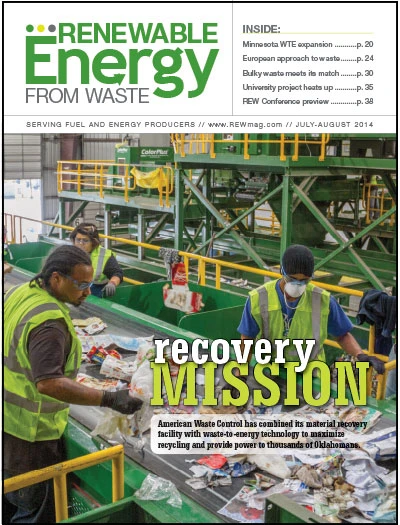
With about 40 percent of U.S. waste recycled, composted or sent to waste-to-energy (WTE), anaerobic digestion (AD) has been increasingly pursued as part of states’ infrastructure mix in an effort to increase waste diversion. Organics make up one quarter of the waste destined for disposal, and although most communities already separate yard waste, a significant amount of food scraps and soiled paper remain in the waste. California, Connecticut, Massachusetts and Vermont offer grants/loans/guarantee programs to support the development of AD infrastructure.
Although AD facilities have traditionally been pursued at wastewater treatment facilities or on farms where uncontaminated manure feedstock is abundant, recently municipal food and yard waste AD projects have started gaining traction. AD uses a biochemical process where microorganisms break down organic waste in an oxygen-depleted environment, producing biogas and digestate products.
The biogas can be purified to natural gas quality and then compressed for use as vehicle fuel or for electricity production. The digestate residue can be used as liquid fertilizer or can be cocomposted with yard/green waste into soil amendment. AD technology is a WTE and recycling solution for organic waste.
Currently, some 20 standalone AD plants are operating in the U.S. with municipal-solid-waste-derived (MSW-derived) feedstocks, including two R&D plants. Fifteen additional plants are under construction or are in development. Most of these plants process food waste from commercial generators, including food processing waste, and some process residential food waste. Tipping fees at these plants are in the $25- to $50-per-ton range.
A table, available online at www.REWmag.com/rew0814-ad-developments.aspx, lists existing commercial AD plants in the U.S., and others under development. Many additional communities have issued RFPs or are in the process of developing AD systems, including Cleveland; Prince William County, Virginia; and Iowa City, Iowa.
Municipalities with separate organics curbside collection programs increased to 183 in 2013 (Biocycle, March 2013), with California, Minnesota and Washington as the leaders. With more than 9,000 curbside waste collection programs across the U.S., increasing organics diversion is an obvious opportunity.
The use of existing in-kitchen garbage disposals to divert food scraps generated in the home also is being pursued by the world’s leading garbage disposal manufacturer, St. Louis-based Emerson. Food scraps go down the drain to the receiving wastewater treatment facility, contributing to their AD facility’s biogas production.
On the commercial side, generators that have implemented separate collection of food waste, choosing correct-sized waste containers and pick-up frequency, have decreased service charges and hauling costs.
AD is one of the most quickly growing WTE solutions in the U.S. AD also has become an integral part of mixed waste processing facilities, also known as Mechanical Biological Treatment (MBT).
Organics can be processed out from mixed waste, eliminating reliance on separate collection. The integration of AD at the Montgomery, Alabama, project referenced in the online table and the partnership of Covanta and Turning Earth have the potential to show that AD certainly has a spot in our integrated waste management system.
Many plants are starting up or are under development, and it will be important to understand the results of this evolution on U.S. waste management practices, all the way back from the kitchen!

Harvey Gershman is president of Gershman, Brickner & Bratton, Inc., solid waste management consultants; hgershman@gbbinc.com. Research assistance provided by Ljupka Arsova, consultant II, GBB.

Explore the August 2014 Issue
Check out more from this issue and find your next story to read.
Latest from Waste Today
- Louisiana city launches glass recycling program
- City eWaste, Williamson County, Tennessee, offer electronics recycling stations
- Casella commits $1.5M to launch circular economy center at the University of Vermont
- Mavitec Green Energy expands in US market
- Eagle Dumpster Rental identifies its MRF-unfriendly items
- American Securities acquires Integrated Global Services Inc.
- Fleetio integrates Maintenance Shop Network add-in
- 3rd Eye expands suite of fleet safety solutions





